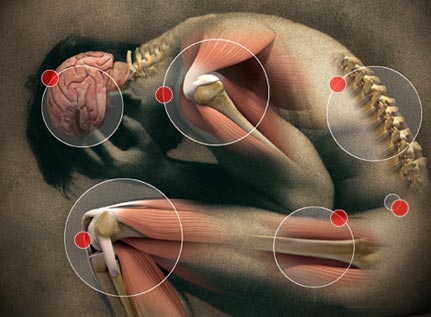Chronic pain may be constant or it comes and goes, but either way it is very uncomfortable and can reach the point that it prevents you from performing your daily activities and routine. Chronic pain can be attributed to a number of things such as illness, a medical condition, injury and other causes.
Common Types of Chronic Pain
There are several kinds of chronic pain, but the most widely experienced are pain due to arthritis, headaches, pain in the lower back, and body aches caused by cancer, nerve damage and sickle cell disease. Because inflammation can change your nervous system, the pain usually stays even after the actual injury has healed physically. Regardless of the type of pain you are experiencing, it can be very frustrating and even lead to a feeling of helplessness and being unable to do anything. Not only do you feel uncomfortable, but it can affect you emotionally and affect your work productivity and relationships. For this reason, pain management is essential.
Tips for Managing Chronic Pain
 The first thing you should do is learn as much as you can about what is causing the pain, as that will pave the way for pain management and treatment. Second, you should keep a diary and write when and where the pain hurts, how frequently it occurs and what makes the condition worse or better. The more you understand about your condition, the easier it will be when you consult a health care provider, as he/she will know what medication to prescribe to you. Once your pain has been identified, your doctor will be able to develop a pain management plan and include not just medication but also a change in diet, exercise, meditation and living a healthier lifestyle. Your health care provider can also provide treatments if you are suffering emotionally or mentally due to the pain you are feeling.
The first thing you should do is learn as much as you can about what is causing the pain, as that will pave the way for pain management and treatment. Second, you should keep a diary and write when and where the pain hurts, how frequently it occurs and what makes the condition worse or better. The more you understand about your condition, the easier it will be when you consult a health care provider, as he/she will know what medication to prescribe to you. Once your pain has been identified, your doctor will be able to develop a pain management plan and include not just medication but also a change in diet, exercise, meditation and living a healthier lifestyle. Your health care provider can also provide treatments if you are suffering emotionally or mentally due to the pain you are feeling.
Treatment Options
There are several drugs and medications your doctor can give you. Some of these drugs will not completely eradicate the pain but it can make the condition more manageable and allow you to perform your daily activities. For these medications to work you need to do more than just take them though, as it also requires a change in lifestyle so you are healthier. Some of these pain medications are meant for long term use and have to be taken for extended periods, while others are short acting, meaning they are meant for those aches that suddenly flare up.
One of these pain medications is Buprenex, a prescription medication designed specifically to treat mild to severe pain. Buprenex relieves discomfort by attaching to the opioid receptors in your body, which helps reduce pain. This medication is in the form of an injection and given via IV or directly on the muscle. Buprenex is an effective pain reliever, but there are potential side effects like dizziness, nausea, and drowsiness. If you are using other medication, you should tell your doctor before having the drug administered to avoid complications.
Share This